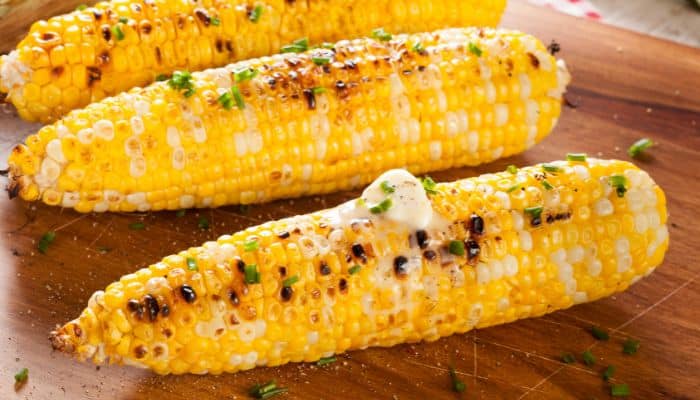Health Benefits of Corn on the Cob: A Nutritional Powerhouse
Corn on the cob, a beloved summertime staple, offers more than just a delightful treat at barbecues and picnics. This versatile and nutritious vegetable boasts a range of health benefits that contribute positively to human health. From providing essential nutrients to supporting digestive health, corn on the cob is a valuable addition to a balanced diet. This article explores the various health benefits of corn on the cob and why it deserves a prominent place on your plate.
Nutritional Profile of Corn on the Cob
Corn on the cob is rich in essential nutrients that promote overall health. A single ear of corn (about 90 grams) contains:
- Calories: Approximately 77
- Carbohydrates: 19 grams
- Fiber: 2 grams
- Protein: 3 grams
- Fat: 1 gram
- Vitamins: High in vitamin B6, niacin (B3), and folate (B9)
- Minerals: Contains magnesium, potassium, and phosphorus
Additionally, corn is a source of antioxidants, including lutein and zeaxanthin, which are beneficial for eye health.
Digestive Health Support
One of the standout benefits of corn on the cob is its fiber content. Dietary fiber is crucial for maintaining a healthy digestive system. Corn on the cob provides both soluble and insoluble fiber:
- Insoluble Fiber: This type of fiber adds bulk to the stool, promoting regular bowel movements and preventing constipation. Insoluble fiber helps maintain gut health by ensuring that waste passes smoothly through the digestive tract.
- Soluble Fiber: Soluble fiber dissolves in water to form a gel-like substance that slows digestion. This type of fiber can help regulate blood sugar levels and lower cholesterol.
Together, these fibers support a healthy digestive system, reduce the risk of gastrointestinal disorders, and contribute to overall gut health.
Heart Health
Corn on the cob can be a heart-friendly addition to your diet. Its soluble fiber content helps manage cholesterol levels by binding with cholesterol in the digestive system and removing it from the body. Lower cholesterol levels are associated with a reduced risk of cardiovascular diseases.
Additionally, the potassium in corn helps regulate blood pressure by balancing the effects of sodium. Adequate potassium intake is essential for maintaining healthy blood pressure levels, thereby supporting heart health and reducing the risk of stroke and heart disease.
Antioxidant Properties
Corn on the cob is rich in antioxidants such as vitamin C, lutein, and zeaxanthin. These antioxidants play a crucial role in protecting the body from oxidative stress caused by free radicals. Oxidative stress is linked to chronic diseases such as cancer, heart disease, and aging-related conditions.
- Vitamin C: As a powerful antioxidant, vitamin C helps protect cells from damage, supports the immune system, and promotes skin health by aiding collagen production.
- Lutein and Zeaxanthin: These antioxidants are particularly beneficial for eye health. They accumulate in the retina, where they help filter harmful blue light and protect against age-related macular degeneration and cataracts.
Energy Boost
Corn on the cob is a good source of carbohydrates, the body’s primary energy source. The natural sugars and complex carbohydrates in corn provide a steady release of energy, making it an excellent food for maintaining energy levels throughout the day. Unlike simple sugars found in processed foods, the complex carbohydrates in corn are digested more slowly, providing sustained energy and helping to prevent blood sugar spikes and crashes.
Weight Management
Despite being relatively low in calories, corn on the cob is filling and satisfying due to its fiber content. Foods high in fiber can promote satiety, helping you feel full longer and reducing overall calorie intake. Including corn on the cob as part of a balanced diet can aid in weight management by curbing overeating and supporting a healthy metabolism.
Skin Health
The antioxidants and vitamins in corn on the cob contribute to skin health. Vitamin C, in particular, is vital for collagen production, which maintains skin elasticity and firmness. Antioxidants help combat the damaging effects of UV radiation and environmental pollutants, potentially slowing the signs of aging and promoting a youthful complexion.
Supports Immune Function
Corn on the cob contains several nutrients that support a robust immune system. Vitamin C enhances the production and function of white blood cells, the body’s primary defense against infections. Additionally, the presence of B vitamins, such as niacin and folate, supports overall cellular function and helps maintain a healthy immune response.
Bone Health
Corn on the cob provides essential minerals like magnesium and phosphorus, which are crucial for maintaining strong and healthy bones. Magnesium helps with calcium absorption and bone formation, while phosphorus is a key component of bone mineral density. Including corn in your diet can contribute to the prevention of bone-related disorders such as osteoporosis.
Conclusion
Corn on the cob is more than just a tasty treat; it is a nutritional powerhouse offering numerous health benefits. Its rich content of essential nutrients, fiber, antioxidants, and energy-boosting carbohydrates make it a valuable addition to any diet. By supporting digestive health, heart health, immune function, and more, corn on the cob can play a significant role in promoting overall well-being. As part of a balanced and varied diet, this versatile vegetable can help you maintain a healthy lifestyle and enjoy a wide range of health benefits.



Comments are closed.